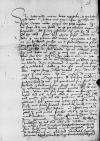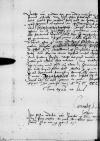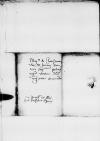List #430
Cornelis DE SCHEPPER do Ioannes DANTISCUSBrussels, 1529-05-25
Regest polski:
De Schepper returns to their mutual complaints about the absence of letters. He regrets that he was unable to give a better reception to Dantiscus' brother [Bernhard von Höfen] before his departure. He praises the qualities of his wife [Elisabeth Donche]. He highly appreciates her understanding of the requirements of his profession.
He wanted to leave earlier for Spain, but was prevented by adverse travel conditions. Now that he has learned that Dantiscus still remains at the imperial court, he has every reason to leave. Another incentive to travel is the support from Dantiscus and [Alfonso de] Valdés towards securing him a position in the imperial chancery. He refers to his frequent correspondence with Dantiscus, the Chancellor [Mercurino Gattinara] and Valdés on this subject. He is sceptical about the intended departure for Italy and he wants Dantiscus to inform the chancellor about this.
Dantiscus is right in not wanting to travel through France. He sent news about Dantiscus to his brother [Bernhard von Höfen], and insists that he should have confidence in his Sovereigns [King Sigismund I and Queen Bona Sforza]. De Schepper himself sent a letter to the Polish King and Queen, and to [Jan] Zambocki, who owes his promotion to royal secretary to De Schepper. A letter arrived from [Nikolaus] Nibschitz that was illegible, probably written when he was drunk. De Schepper wrote again to the Chancellor. He asks Dantiscus to support his interests.
Peace negotiations with the French are taking place. Dantiscus should gain the support of Valdés in De Schepper's case. He never obstructed Valdés, and his future commitment will bring Valdés more honour than harm.
He gives details about his return to Spain in cipher, and asks Dantiscus to notify Valdés and other friends about this.
In a postscript De Schepper invites Dantiscus to send him a letter through the messenger who will soon return [to Brussels].
| odebrano Barcelona, [1529]-06-06 Rękopiśmienne podstawy źródłowe:
Publikacje:
| ||||||||||||
Tekst + aparat krytyczny + komentarz Zwykły tekst Tekst + komentarz Tekst + aparat krytyczny Ekscerpty dotyczące podróży Dantyszka
Magnifico et clarissimo viro, Domino
Salutem.
Tu habes, quod mecum libere expostules, et ego habeo, quod tecum. Condona mihi meam culpam, ego tuam tibi facile, tametsi neutri quicquam iure potest imputari. Ego enim scripsi ad te non semel, hoc est pro condicione orig. conditione⌈condicionecondicione orig. conditione⌉ temporum frequenter, sed si non perferuntur litterae, quid hoc ad me? Sed haec alias.
Scripsi ad te toties, etiam ad cancellarium. encrypted ⌈etiam ad
Valde autem gaudeo, ex quo audio noluisse te per
Scripsi ad illustrem dominum
Nosti hic pacem tractari inter
Tuus ex animo ut filius
Postscript:
Iste posta redibit cito. Scribe per hunc, ut possim fieri certior, et noli dimittere hanc occasionem. Id te oro per genium tuum.



 AAWO, AB, D.3, f. 26av
AAWO, AB, D.3, f. 26av